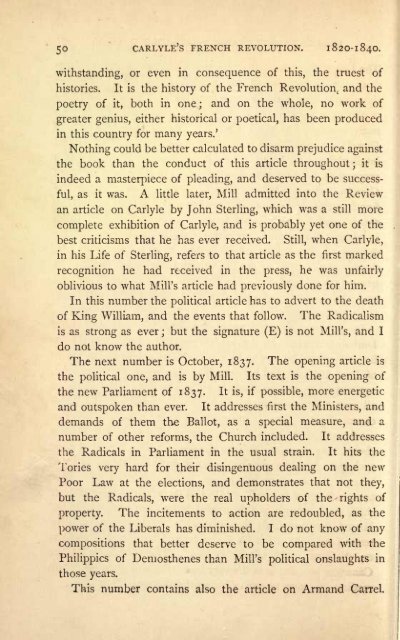John Stuart Mill: A Criticism with Personal Recollections
John Stuart Mill: A Criticism with Personal Recollections
John Stuart Mill: A Criticism with Personal Recollections
You also want an ePaper? Increase the reach of your titles
YUMPU automatically turns print PDFs into web optimized ePapers that Google loves.
50 CARLYLE S FRENCH REVOLUTION. 1820-1840.<br />
<strong>with</strong>standing, or even in consequence of this, the truest of<br />
histories. It is the history of the French Revolution ( and the<br />
poetry of it, both in one; and on the whole, no work of<br />
greater genius, either historical or poetical, has been produced<br />
in this country for many years.<br />
Nothing could be better calculated to disarm prejudice against<br />
the book than the conduct of this article throughout; it is<br />
indeed a masterpiece of pleading, and deserved to be success<br />
ful, as it was. A little later, <strong>Mill</strong> admitted into the Review<br />
an article on Carlyle by <strong>John</strong> Sterling, which was a still more<br />
complete exhibition of Carlyle, and is probably yet one of the<br />
best criticisms that he has ever received. Still, when Carlyle,<br />
in his Life of Sterling, refers to that article as the first marked<br />
recognition he had received in the press, he was unfairly<br />
oblivious to what <strong>Mill</strong> s article had previously done for him.<br />
In this number the political article has to advert to the death<br />
of King William, and the events that follow. The Radicalism<br />
is as strong as ever ; but the signature (E) is not <strong>Mill</strong> s, and I<br />
do not know the author.<br />
The next number is October, 1837. The opening article is<br />
the political one, and is by <strong>Mill</strong>. Its text is the opening of<br />
the new Parliament of 1837. It is, if possible, more energetic<br />
and outspoken than ever. It addresses first the Ministers, and<br />
demands of them the Ballot, as a special measure, and a<br />
number of other reforms, the Church included. It addresses<br />
the Radicals in Parliament in the usual strain. It hits the<br />
Tories very hard for their disingenuous dealing on the new<br />
Poor Law at the elections, and demonstrates that not they,<br />
but the Radicals, were the real upholders of the rights of<br />
property. The incitements to action are redoubled,<br />
as the<br />
power of the Liberals has diminished. I do not know of any<br />
compositions that better deserve to be compared <strong>with</strong> the<br />
Philippics of Demosthenes than <strong>Mill</strong> s political onslaughts in<br />
those years.<br />
This number contains also the article on Armand Carrel.

















